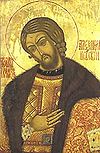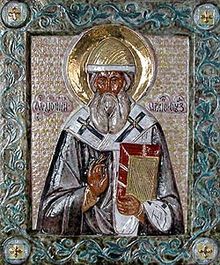- Dionysius I, Metropolitan of Moscow
-
Saint Dionysius I (Russian: Дионисий); baptismal name: David(Давид) (1300? - October 15, 1385) was a Russian Orthodox metropolitan in 1384-1385.
As a young man David entered the Kiev Caves Lavra, where he was tonsured a monk and given the religious name Dionysius. He is known to have spent a number of years living in a cave that he dug out himself on the banks of the Volga River not far from Nizhny Novgorod. Later, Dionysius founded the Pechersky Monastery on that same spot, which was dedicated in honour of the Ascension of the Lord. In 1374, he was consecrated the Bishop of Suzdal and won love and respect on the part of the locals.
In 1378, Dionysius was recommended as Metropolitan of Moscow by St. Sergius of Radonezh after the death of Metropolitan Alexius. However, Grand Prince Dmitri Donskoi had his own candidate - a priest by the name of Mikhail (Mityaya). Dionysius was one of a number of bishops at the council who opposed Mikhail, who was suspected of heresy (Strigolniki). If elected, Mikhail wanted to introduce a new way of enthroning the Metropolitan at home, in Russia, rather than traveling to Constantinople to be installed by the Ecumenical Patriarch (at the time, Russia was not yet an autocephalous church). In 1379 Dionysius went to Constantinople carrying a protest against the choice of Mikhail addressed to the Patriarch. Mikhail was afraid that Dionysius would get the patriarch's blessing and followed him to Constantinople. However, Mikhail died on his way there and one of his accompanying clergymen, Archmandrite Pimen, reached Constantinople (Slavonic: Tzargrad) before Dionysius and was named Metropolitan of Moscow and All Rus' in place of Mikhail.
In 1382 the Dionysius received the title of archbishop from the Patriarch, who was impressed with his piety and humility. In 1383, Dionysius returned from this long journey to his congregation at Suzdal and continued his struggle against the Strigolniki. He also implored Dmitri Donskoi against Pimen, whom he viewed as a usurper, since no one in the Russian Church, not even the Great Prince himself, had been consulted before Pimen was appointed Metropolitan. In 1384, Dionysius was sent back to Constantinople to ask for Pimen's deposition and his own appointment as Metropolitan. Patriarch Neilus Kerameus was not sure whether he could trust Dionysius and sent two metropolitans to Moscow, who were supposed to depose Pimen and install the archbishop of Suzdal. On his way back to Moscow, Dionysius stopped in Kiev, where he was detained by the Kievan prince Vladimir Olgerdovich at the insistence of Cyprian, Archbishop of Kiev, who was to have succeeded as Metropolitan of Moscow in 1378 upon the death of Alexius, but who was not finally welcomed into Moscow until 1390. Dionysius died in detention on October 15, 1385. He was buried in the Caves of St. Anthony at Kiev, in the monastery in which he began his spiritual life.
The Russian Orthodox Church used to celebrate his feast day on July 19, but subsequently this tradition died down. He is now commemorated on October 15 of the traditional Julian Calendar (October 28 on the modern Gregorian Calendar), where he is listed as "Metropolitan of Suzdal", since he was never able to take possession of his Metropolitan See.
External links
Orthodox Church titles Preceded by
PimenMetropolitan of Moscow Succeeded by
Cyprian (restored)People from Russia Leaders and religious - Pre-1168
- 1168–1917
- 1922–1991
- 1991–present
- RSFSR leaders
- General secretaries
- Soviet premiers (1st deputies)
- Soviet heads of state (and their spouses)
- Prime ministers (1st deputies)
- Foreign ministers
- Prosecutors general
- Metropolitans and patriarchs
- Saints

Military and explorers - Field marshals
- Soviet marshals
- Admirals
- Aviators
- Cosmonauts
Scientists and inventors - Aerospace engineers
- Astronomers and astrophysicists
- Biologists
- Chemists
- Earth scientists
- Electrical engineers
- IT developers
- Linguists and philologists
- Mathematicians
- Naval engineers
- Physicians and psychologists
- Physicists
- Weaponry makers
Artists and writers Sportspeople - Chess players
Categories:- Metropolitans and Patriarchs of Moscow
- 1300s births
- 1385 deaths
Wikimedia Foundation. 2010.

